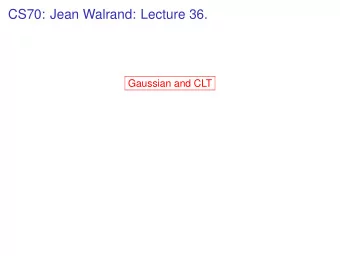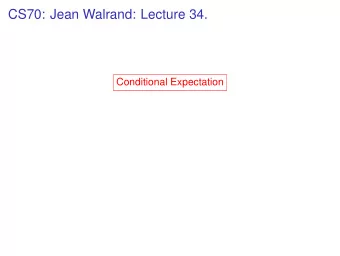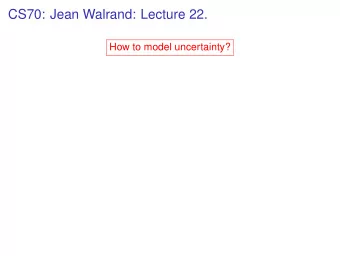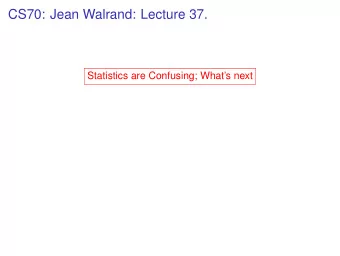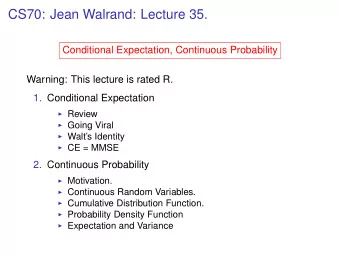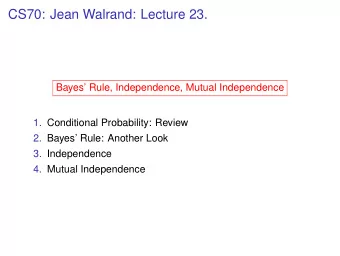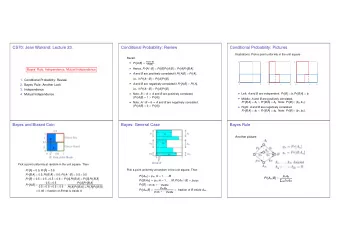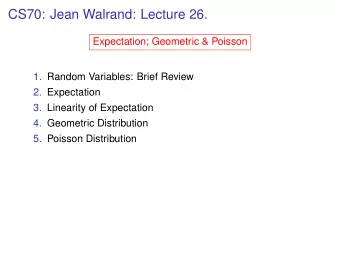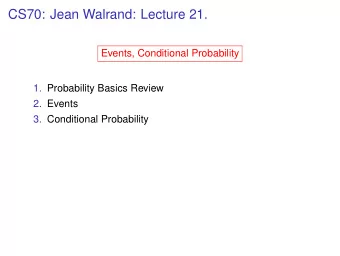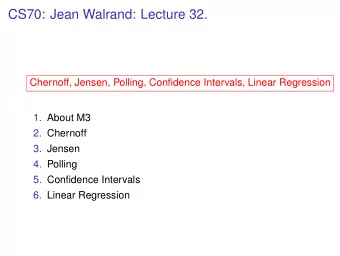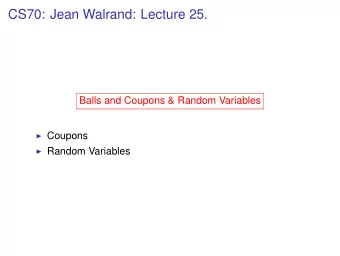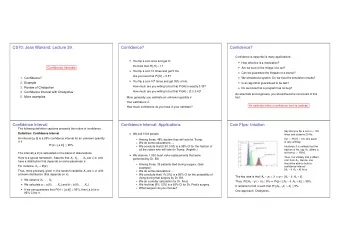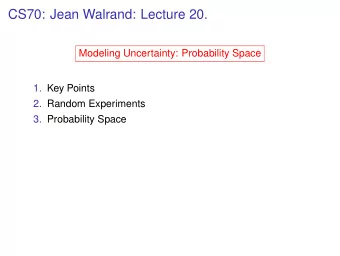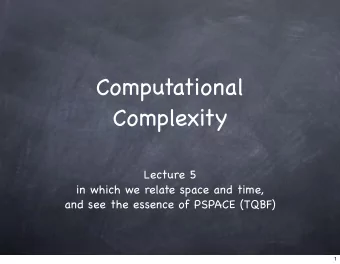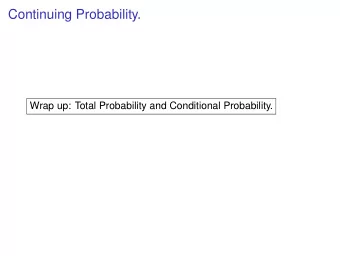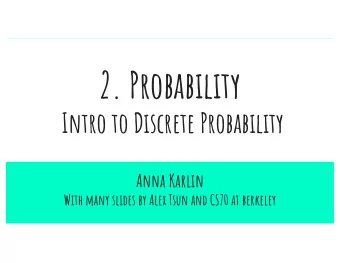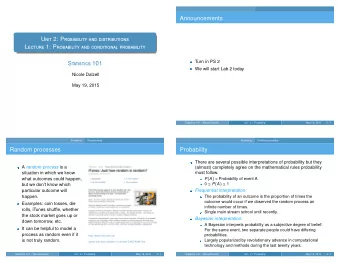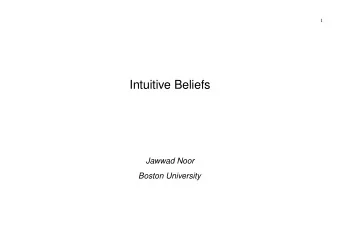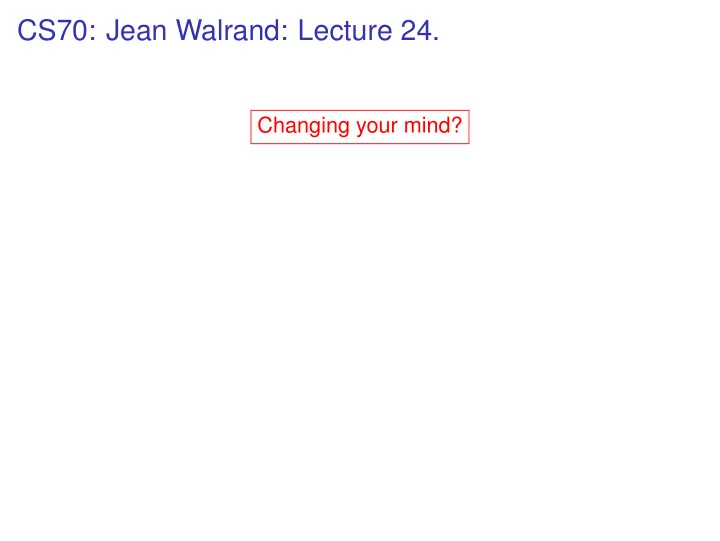
CS70: Jean Walrand: Lecture 24. Changing your mind? CS70: Jean - PowerPoint PPT Presentation
CS70: Jean Walrand: Lecture 24. Changing your mind? CS70: Jean Walrand: Lecture 24. Changing your mind? 1. Bayes Rule. 2. Examples. Recall definition: Conditional Probability. Consider = { 1 , 2 ,..., N } with Pr [ n ] = p n . Recall
Monty Hall Game. Monty Hall is the host of a game show. His assistant is Carol. ◮ Three doors; one prize
Monty Hall Game. Monty Hall is the host of a game show. His assistant is Carol. ◮ Three doors; one prize two goats. ◮ Choose one door, say door 1.
Monty Hall Game. Monty Hall is the host of a game show. His assistant is Carol. ◮ Three doors; one prize two goats. ◮ Choose one door, say door 1. ◮ Carol opens another door with a goat, say door 3.
Monty Hall Game. Monty Hall is the host of a game show. His assistant is Carol. ◮ Three doors; one prize two goats. ◮ Choose one door, say door 1. ◮ Carol opens another door with a goat, say door 3. ◮ Monty offers you a chance to switch doors, i.e., choose door 2.
Monty Hall Game. Monty Hall is the host of a game show. His assistant is Carol. ◮ Three doors; one prize two goats. ◮ Choose one door, say door 1. ◮ Carol opens another door with a goat, say door 3. ◮ Monty offers you a chance to switch doors, i.e., choose door 2. ◮ What do you do?
Monty Hall Game
Monty Hall Game Recall: You picked door 1 and Carol opened door 3. Should you switch to door 2?
Monty Hall Game Recall: You picked door 1 and Carol opened door 3. Should you switch to door 2? First intuition: Doors 1 and 2 are equally likely to hide the prize: no need to switch.
Monty Hall Game Recall: You picked door 1 and Carol opened door 3. Should you switch to door 2? First intuition: Doors 1 and 2 are equally likely to hide the prize: no need to switch. Opening door 3 did not tell us anything about doors 1 and 2.
Monty Hall Game Recall: You picked door 1 and Carol opened door 3. Should you switch to door 2? First intuition: Doors 1 and 2 are equally likely to hide the prize: no need to switch. Opening door 3 did not tell us anything about doors 1 and 2. Wrong!
Monty Hall Game Recall: You picked door 1 and Carol opened door 3. Should you switch to door 2? First intuition: Doors 1 and 2 are equally likely to hide the prize: no need to switch. Opening door 3 did not tell us anything about doors 1 and 2. Wrong! Better observation: If you switch, you get the prize, except it it is behind door 1.
Monty Hall Game Recall: You picked door 1 and Carol opened door 3. Should you switch to door 2? First intuition: Doors 1 and 2 are equally likely to hide the prize: no need to switch. Opening door 3 did not tell us anything about doors 1 and 2. Wrong! Better observation: If you switch, you get the prize, except it it is behind door 1. Thus, by switching, you get the prize with probability 2 / 3.
Monty Hall Game Recall: You picked door 1 and Carol opened door 3. Should you switch to door 2? First intuition: Doors 1 and 2 are equally likely to hide the prize: no need to switch. Opening door 3 did not tell us anything about doors 1 and 2. Wrong! Better observation: If you switch, you get the prize, except it it is behind door 1. Thus, by switching, you get the prize with probability 2 / 3. If you do not switch, you get it with probability 1 / 3.
Monty Hall Game Analysis Ω = { 1 , 2 , 3 } 2 ; ω = ( a , b ) = ( prize , your initial choice ); uniform.
Monty Hall Game Analysis Ω = { 1 , 2 , 3 } 2 ; ω = ( a , b ) = ( prize , your initial choice ); uniform. If you do not switch, you win if a = b .
Monty Hall Game Analysis Ω = { 1 , 2 , 3 } 2 ; ω = ( a , b ) = ( prize , your initial choice ); uniform. If you do not switch, you win if a = b . If you switch, you win if a � = b .
Monty Hall Game Analysis Ω = { 1 , 2 , 3 } 2 ; ω = ( a , b ) = ( prize , your initial choice ); uniform. If you do not switch, you win if a = b . If you switch, you win if a � = b . E.g., ( a , b ) = ( 1 , 2 ) → shows 3
Monty Hall Game Analysis Ω = { 1 , 2 , 3 } 2 ; ω = ( a , b ) = ( prize , your initial choice ); uniform. If you do not switch, you win if a = b . If you switch, you win if a � = b . E.g., ( a , b ) = ( 1 , 2 ) → shows 3 → switch to 1 .
Monty Hall Game Analysis Ω = { 1 , 2 , 3 } 2 ; ω = ( a , b ) = ( prize , your initial choice ); uniform. If you do not switch, you win if a = b . If you switch, you win if a � = b . E.g., ( a , b ) = ( 1 , 2 ) → shows 3 → switch to 1 . Pr [ { ( a , b ) | a = b } ] =
Monty Hall Game Analysis Ω = { 1 , 2 , 3 } 2 ; ω = ( a , b ) = ( prize , your initial choice ); uniform. If you do not switch, you win if a = b . If you switch, you win if a � = b . E.g., ( a , b ) = ( 1 , 2 ) → shows 3 → switch to 1 . Pr [ { ( a , b ) | a = b } ] = 3 9 = 1 3
Monty Hall Game Analysis Ω = { 1 , 2 , 3 } 2 ; ω = ( a , b ) = ( prize , your initial choice ); uniform. If you do not switch, you win if a = b . If you switch, you win if a � = b . E.g., ( a , b ) = ( 1 , 2 ) → shows 3 → switch to 1 . Pr [ { ( a , b ) | a = b } ] = 3 9 = 1 3 Pr [ { ( a , b ) | a � = b } ] =
Monty Hall Game Analysis Ω = { 1 , 2 , 3 } 2 ; ω = ( a , b ) = ( prize , your initial choice ); uniform. If you do not switch, you win if a = b . If you switch, you win if a � = b . E.g., ( a , b ) = ( 1 , 2 ) → shows 3 → switch to 1 . Pr [ { ( a , b ) | a = b } ] = 3 9 = 1 3 Pr [ { ( a , b ) | a � = b } ] = 1 − Pr [ { ( a , b ) | a = b } ] = 2 3 .
Independence Definition: Two events A and B are independent if
Independence Definition: Two events A and B are independent if Pr [ A ∩ B ] = Pr [ A ] Pr [ B ] .
Independence Definition: Two events A and B are independent if Pr [ A ∩ B ] = Pr [ A ] Pr [ B ] . Examples:
Independence Definition: Two events A and B are independent if Pr [ A ∩ B ] = Pr [ A ] Pr [ B ] . Examples: ◮ When rolling two dice, A = sum is 7 and B = red die is 1 are
Independence Definition: Two events A and B are independent if Pr [ A ∩ B ] = Pr [ A ] Pr [ B ] . Examples: ◮ When rolling two dice, A = sum is 7 and B = red die is 1 are independent;
Independence Definition: Two events A and B are independent if Pr [ A ∩ B ] = Pr [ A ] Pr [ B ] . Examples: ◮ When rolling two dice, A = sum is 7 and B = red die is 1 are independent; ◮ When rolling two dice, A = sum is 3 and B = red die is 1 are
Independence Definition: Two events A and B are independent if Pr [ A ∩ B ] = Pr [ A ] Pr [ B ] . Examples: ◮ When rolling two dice, A = sum is 7 and B = red die is 1 are independent; ◮ When rolling two dice, A = sum is 3 and B = red die is 1 are not independent;
Independence Definition: Two events A and B are independent if Pr [ A ∩ B ] = Pr [ A ] Pr [ B ] . Examples: ◮ When rolling two dice, A = sum is 7 and B = red die is 1 are independent; ◮ When rolling two dice, A = sum is 3 and B = red die is 1 are not independent; ◮ When flipping coins, A = coin 1 yields heads and B = coin 2 yields tails are
Independence Definition: Two events A and B are independent if Pr [ A ∩ B ] = Pr [ A ] Pr [ B ] . Examples: ◮ When rolling two dice, A = sum is 7 and B = red die is 1 are independent; ◮ When rolling two dice, A = sum is 3 and B = red die is 1 are not independent; ◮ When flipping coins, A = coin 1 yields heads and B = coin 2 yields tails are independent;
Independence Definition: Two events A and B are independent if Pr [ A ∩ B ] = Pr [ A ] Pr [ B ] . Examples: ◮ When rolling two dice, A = sum is 7 and B = red die is 1 are independent; ◮ When rolling two dice, A = sum is 3 and B = red die is 1 are not independent; ◮ When flipping coins, A = coin 1 yields heads and B = coin 2 yields tails are independent; ◮ When throwing 3 balls into 3 bins, A = bin 1 is empty and B = bin 2 is empty are
Independence Definition: Two events A and B are independent if Pr [ A ∩ B ] = Pr [ A ] Pr [ B ] . Examples: ◮ When rolling two dice, A = sum is 7 and B = red die is 1 are independent; ◮ When rolling two dice, A = sum is 3 and B = red die is 1 are not independent; ◮ When flipping coins, A = coin 1 yields heads and B = coin 2 yields tails are independent; ◮ When throwing 3 balls into 3 bins, A = bin 1 is empty and B = bin 2 is empty are not independent;
Independence and conditional probability Fact: Two events A and B are independent if and only if
Independence and conditional probability Fact: Two events A and B are independent if and only if Pr [ A | B ] = Pr [ A ] .
Independence and conditional probability Fact: Two events A and B are independent if and only if Pr [ A | B ] = Pr [ A ] . Indeed:
Independence and conditional probability Fact: Two events A and B are independent if and only if Pr [ A | B ] = Pr [ A ] . Indeed: Pr [ A | B ] = Pr [ A ∩ B ] Pr [ B ] , so that
Independence and conditional probability Fact: Two events A and B are independent if and only if Pr [ A | B ] = Pr [ A ] . Indeed: Pr [ A | B ] = Pr [ A ∩ B ] Pr [ B ] , so that Pr [ A | B ] = Pr [ A ] ⇔ Pr [ A ∩ B ] = Pr [ A ] Pr [ B ]
Independence and conditional probability Fact: Two events A and B are independent if and only if Pr [ A | B ] = Pr [ A ] . Indeed: Pr [ A | B ] = Pr [ A ∩ B ] Pr [ B ] , so that Pr [ A | B ] = Pr [ A ] ⇔ Pr [ A ∩ B ] = Pr [ A ] ⇔ Pr [ A ∩ B ] = Pr [ A ] Pr [ B ] . Pr [ B ]
Total probability Here is a simple useful fact:
Total probability Here is a simple useful fact: Pr [ B ] = Pr [ A ∩ B ]+ Pr [¯ A ∩ B ] .
Total probability Here is a simple useful fact: Pr [ B ] = Pr [ A ∩ B ]+ Pr [¯ A ∩ B ] .
Total probability Here is a simple useful fact: Pr [ B ] = Pr [ A ∩ B ]+ Pr [¯ A ∩ B ] . Indeed, B is the union of two disjoint sets A ∩ B and ¯ A ∩ B .
Total probability Here is a simple useful fact: Pr [ B ] = Pr [ A ∩ B ]+ Pr [¯ A ∩ B ] . Indeed, B is the union of two disjoint sets A ∩ B and ¯ A ∩ B . Thus, Pr [ B ] = Pr [ A ] Pr [ B | A ]+ Pr [¯ A ] Pr [ B | ¯ A ] .
Total probability Assume that Ω is the union of the disjoint sets A 1 ,..., A N .
Total probability Assume that Ω is the union of the disjoint sets A 1 ,..., A N . Then, Pr [ B ] = Pr [ A 1 ∩ B ]+ ··· + Pr [ A N ∩ B ] .
Total probability Assume that Ω is the union of the disjoint sets A 1 ,..., A N . Then, Pr [ B ] = Pr [ A 1 ∩ B ]+ ··· + Pr [ A N ∩ B ] . Indeed, B is the union of the disjoint sets A n ∩ B for n = 1 ,..., N .
Recommend
More recommend
Explore More Topics
Stay informed with curated content and fresh updates.
